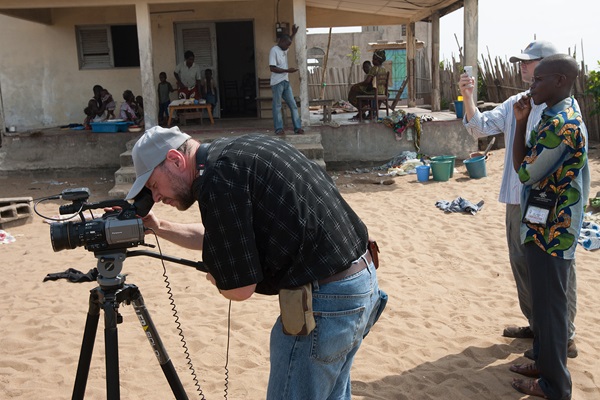In his 40 years of working on United Methodist productions and shooting in locations around the world, Harry Leake has learned a thing or two about overcoming challenges. The biggest one? “You have to have faith,” says Leake, who leads United Methodist Communications’ production team.
"Only through my faith in the power of God’s presence and the strength and guidance that comes with that, have I been able to move forward with many of the messages and stories we have told. I have been humbled by the awareness that God’s purposes are not always understood and with faith and patience, I have seen some amazing things happen even in times of perceived failure."
Most people realize a video production takes time, effort, and talent to put together, but many are surprised by the level of detail required to get a project done right. This requires pre-production planning and taking time to process all the necessary details. Sometimes it’s the locale that creates difficulties. "Madras and New Delhi India were the most exotic, beautiful, and yet difficult locations I've ever worked in," Leake says. “Temperatures hit 110 degrees, intermittent electric power at the location shoots, and transportation issues between video sites.”
So, what happens in 2020, when a pandemic hits and video takes center stage in keeping people connected? How do you adapt your production process when you can’t shoot on location and you need to keep cast and crew safe? "Initially, we had a total shutdown of operation for about a month,” said Leake. “In that time, the production team discussed and evaluated how to continue to do messaging differently by use of virtual meeting programs and social messaging.”
Leake said they started with specific projects that used smaller crews who could do their work while observing social distancing and safe practices. Many of those jobs were audio projects with audio engineers in one room and talent in another room or location. Next, they adapted their video productions, keeping the talent remote, and recording and editing their messaging into the video content.
“We developed what we called imitation Zoom presentations with higher quality gear, recording the messaging with smaller crews and in safely controlled spaces,” said Leake. “This became a necessary process for many clients. Before long, we found that we were busier than before the pandemic because of this new style and our ability to produce, process, and edit for these needs.”
Headquartered in Nashville, Tenn., United Methodist Communications boasts state-of-the-art studios where the production team works with their colleagues inside the agency to support local churches, annual and jurisdictional conferences, and other boards and agencies through the strategic use of video to deliver the stories of the church and its people.
"Working with the UMCom production team has been most helpful,” shares Steven Adair, Director, Local Church Services, UMCom. “Together, we’ve been able to create instructional how-to videos, including how to make better videos for websites and social media. When we need technical support and a creative audio/video production resource for our local churches, our production partners have been our go-to – before and during the pandemic – and certainly, they will continue to be great partners going forward."
To be an effective video storyteller, it is important to let your subject speak and tell their story. Leake says, "It’s the job of the production team to use their talents to present the stories that are already there. A good storyteller recognizes a good message and then listens and presents it in a structured way with a beginning, middle, and end while continuing to respect and reflect the soul of the message and the messenger."
Having a strong team is essential. One of the first steps in planning is to establish the needs of a project and identify the crew talents needed for that job. Just as critical is choosing a team that has good working chemistry –respect for one another with everyone focused on the same goal.
The Rev. Adam Hamilton, Senior Pastor of Church of the Resurrection in Leawood, Kansas has done a number of projects with United Methodist Communications and says the production team is topnotch. “I will say that any television network across the country would be honored and delighted to have this team. They are gifted, they know what they’re doing, they do it right, they’re organized and prepared,” said Rev. Hamilton. “They are a remarkable group of people helping us communicate and helping us do what we do as a denomination and I am profoundly grateful for them.”
*Crisler is a senior public relations specialist at United Methodist Communications.
For 80 years, United Methodist Communications has been leading the church in telling inspirational stories of God’s work in the world through The United Methodist Church, reaching new people, supporting local churches in vibrant communications ministry, equipping leaders and delivering messages of hope and healing. This essential work requires financial support. If you believe in our mission, consider a tax-deductible donation of $8-$80-$800 to the work of United Methodist Communications through its Foundation at ResourceUMC.org/GiveUMCom.

